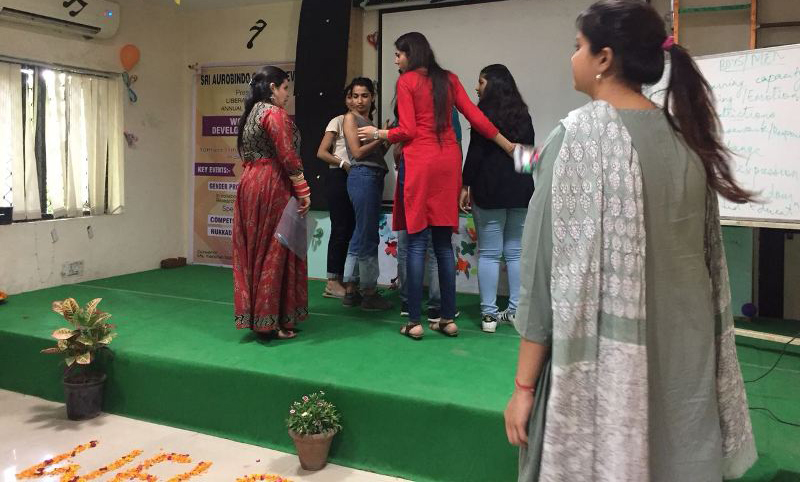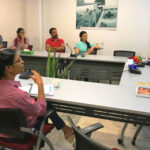On 10th April, 2018, our team consisting of Ms Ritika Bhatia, Ms Esha Chaudhuri and Mr Erik Becker went to Sri Aurobindo College of Delhi University, for a gender sensitization training with the students there. The training at the college was held as a part of the college celebrations, in association with the Women Development Cell. It was attended by about 80 students (both boys and girls) of the evening batch,along with professors and teachers who were intrigued and very much interested in the program. The training was centered on addressing gender at an elementary level by citing examples from our everyday living and issues that concern the young, in particular.


The theme of the training was essentially gender, which the trainers then explored facets of stereotypes, roles and responsibilities, power and patriarchy, which were then linked up to issues such as ‘stalking’, ‘eve-teasing’ and ‘domestic violence’. While the intial section of gender were taken by Ms. Bhatia, the segment on the issues and combating them along with the legal provisions were done by Ms. Chaudhuri.
The methodology was interactive and participatory with the use of games, brainstorming, role plays, usage of audio-visuals, the audience took to it enthusiastically, and were active in engaging with the trainers on issues that they find resonating in their lives. Most of the girls spoke about their restricted freedom to move freely, and dress conservatively for ‘their own good’, while some students also expressed their anger about boys having the freedom ‘to choose’ when and whom to marry. On issues such as stalking and eve-teasing, trainers spoke about redressal measures that both young boys, who experience it distantly as it does not affect them directly and girls who have at some point been subject to it, to take it up with their women development cells, not to be silent spectators when they hear or witness such incidents and take the help of helplines (anti-obscenity, sexual harassment) and the police depending on the severity of the case.
.@GenderTrainings at #DelhiUniversity today! @eshachaudhuri and @sikhnibhatia spoke to #youth about #Gender and #SocialChange! #TuesdayThoughts pic.twitter.com/aLkqDIkuUb
— CSR (@CSR_India) April 10, 2018
Ms. Bhatia spoke about the difference in expectations for boys and girls, and their roles and responsibilities which cause imbalance in society. She also asked students rethink situations if these roles and responsibilities could be interchanged to bring about equality. Speaking on the existence of violence in society, Ms. Chaudhuri spoke on the role of different agents in society from cultural, religious, peer groups, community and society at large that interplay to make what the prevalent systemic problems and how change begins at the personal level. Citing work that CSR has been effectively working on for decades were given as examples to bring about change in society and particularly targeting the role and importance of the youth in being change makers. Lastly, Erik shared his experience in India and his observations on gender especially the marginalized communities, masculinities and why it is important to question authorities.
The training was deemed a success as the students thoroughly enjoyed participating in the games and discussions and was accepting of the new perspectives. Apart from that, the teachers and professors also contributed in the discussions by talking about their personal experiences and the roles as seniors and parents of young children.




